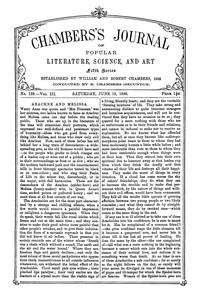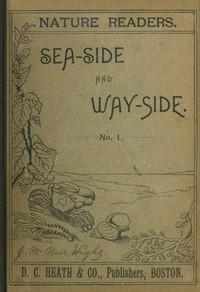Read this ebook for free! No credit card needed, absolutely nothing to pay.
Words: 20781 in 5 pages
This is an ebook sharing website. You can read the uploaded ebooks for free here. No credit cards needed, nothing to pay. If you want to own a digital copy of the ebook, or want to read offline with your favorite ebook-reader, then you can choose to buy and download the ebook.


: Chambers's Journal of Popular Literature Science and Art fifth series no. 129 vol. III June 19 1886 by Various - Periodicals
Release date: August 22, 2023
Original publication: Edinburgh: William and Robert Chambers, 1853
ARACHNE AND MELISSA.
The Arachnides are for the most part characterised by a strange and chilling silence, when a few words would remove a painful impression or enlighten a dangerous ignorance. When they do speak, their words fall like vocal icicles which freeze and cut at the same time; and they contrive to make their good advice more painful than other people's rebukes, and to give their information the form of a sarcastic reproach in that you did not know it all before. Their presence in society reminds one of the winter whose 'Breath was a chain which without a sound, The earth and the air and the water bound.' Where they are, freedom flags and gaiety declines; and only the most robust of those moral pachyderms who oppose their thick insensitiveness to all outside influences whatsoever, can withstand the lethal effect of the Arachnides. Their small pale eyes wither; their pinched lips paralyse; their very smiles are the fracture of a crystal more than the visible sign of a living, friendly heart; and they are the veritable 'freezing mixtures' of life. They take strong and unreasoning dislikes to quite innocent strangers and harmless acquaintances, and will not be convinced that they have no occasion to do so; they quarrel for a mere nothing with those who are so unfortunate as to be their friends and relations, and cannot be induced to make nor to receive an explanation. No one knows what has offended them, but all at once they become like anthropomorphous polar bears to those to whom they had been moderately human a little while before; and more intolerable than ever to those to whom they had been intolerable enough when things were at their best. Then they retreat into their own spiritual den to hammer away at that leaden cup from which they drink the deadly acid that vitiates all their life and destroys all their happiness. They make the worst of things in every direction. If a cloud has come across the sky of others' friendships, they do what they can to increase the trouble and to make that permanent which, by the nature of things and without their evil offices, would have been evanescent. They kill all the tender little sprouts of growing affection between two young people or two likely comrades; and what they cannot do by straightforward means, they do by crooked ones--which comes to the same thing in the end.
Egotist to their finger-tips, the Arachnides make their own small annoyances the one great thought of their lives. They do not make much account of their blessings, only of their misfortunes; and nothing is so large as a microscopic speck on one of their most luscious fruits. The fate of empires and the fall of nations are not so important as the change of a servant or the ill arrangement of a dinner. The loss of a hundred men in a battle does not touch them so much as the loss of a row of cabbages in their garden; and a burnt duster out of a set is a more serious affair in their eyes than a passenger-ship wrecked on the Cornish coast or a merchant-steamer burnt to the water's edge. On one thing only can they be made loquacious--on their own small sufferings. On these they will descant an hour by the clock, and more to come after. But speak to them of the heart-anguish of others, and they are unsympathetic, dumb, indifferent. Their fire burns for themselves alone; to all the world beyond they have only slag and ice to give.
As a physiognomical sign, the Arachnides do not often look you in the face. They glance rather than gaze with straight and level eyes; and they prefer the corners of their eyes to the centres.
When these workers in gold are, what common parlance calls friends, with the workers in lead, the former have a hard time of it. They are always at the point where the Arachnides are backing and the Melissides are pulling--where the one are trying to break and the other doing their best to hold. The Arachnite takes offence at a word, a look, a gesture, a thing done or not done; and the Melissite will not have it. 'Come, old fellow, what's up now?' he says in that round cheery voice of his which suggests honey and sunshine, or a strong west wind, or anything else you like both sweet and wholesome. Probably the Arachnite pinches his lips and says 'Nothing;' but 'nothing' does not answer the purpose, and an explanation is forced--if indeed that poor chilled soul can be forced into anything frank and human. If he cannot, then the other does his best to laugh away the cloud and to go on as before; but it all depends on the mood of the Spider-born whether this frankness will be an offence or a clearance--whether it will win the day or lose it for ever. Unlike the Arachnite, whose analogue is that liquid which, when it is struck or stirred ever so lightly, breaks at once into crystals, the Melissite is almost impossible to freeze. Even his anger has a touch of generous pity in it, in that a man should be such a fool or so wrong-headed; and where the one will not forgive the smallest mistake, the other will forget the gravest wrong and trust to better things in the future. Tender of heart, he nourishes all good impulses in himself, and recognises them with gladness in others; and essentially peace-loving, as the really strong ever are, he is slow to 'wash his spears,' and only when forced by self-respect, goes out to fight his foes. Generous as a master and genial as an administrator, he puts up with the worries and disappointments inevitable to his business, whatever it may be; not troubling the gods with his complaints because men are made of clay, and every now and then break in the handling and fly in the firing. On the contrary, he makes the best of things even when they are bad; and looks to the perfected work rather than to the abortive, which cannot now be mended. He believes in the doctrine of encouragement rather than in the theory of repression, and thinks when men know that they are trusted to do well, they do better than when they know that they are expected to do ill--with the handcuffs to follow. He has no great faith in gags and bearing-reins, whips and spurs, for any kind of team that he may have to manage. He trusts rather to the cheering voice and the guiding hand; and his choice of method is justified by its results. In all troublous times, the Melissite--he who looks at a man's circumstances from that man's own standpoint, and not from one external, unintelligent and unsympathetic--escapes the doom accorded to the Arachnides, and lives in peaceful security where these others are not safe, however well protected. If such as he did not form what Matthew Arnold calls the remnant, society would stand still like the clogged wheels of a watch, and men would perish in the moral desert as they perish in the material. The righteous men who save cities are they who do good to their brother-men as well as they who pray to God; and 'he prayeth best who loveth best' is a phrase we all know by head, and some of us by heart and head as well.
In hours of doubt and danger, the Arachnite despairs; but the Melissite buckles to for the work of decision and deliverances, hoping while a ray of light remains, or a plank whole out of the wreck. The one cannot spell success; the other will not learn to say defeat; the one does not hold on, the other cannot be beaten off. Hence we seldom find the working Arachnides successful in life; and the bread which they have to bake for themselves is apt to be both scant in quantity and sour in quality. The others, on the contrary, for the most part succeed. They have not only a larger volume of life to bear them on, but they have also the art of making friends, such as those poor starved prison-pinched souls do not know. They are thus backed by their own strength, and given a helping hand by the strength of others; where the Arachnides get no extraneous aid, and soon come to the end of their own power. Then they complain of their ill-luck, or speak of secret enemies who work in the dark against them; and, if women, they go into the sunless labyrinth of 'nerves,' by which they excuse their jealousy and ill-temper, their sourness and crossness. They say severely that no one knows what they suffer, save those who are in like manner afflicted, and that they alone can measure the pain they endure. Perhaps the good-tempered interlocutor thinks to himself: 'A little honey mixed in with all thy vinegar, O Arachnite, would soften much of thy misery and reduce thy misfortunes to zero; and the milk of human kindness set to make cream is a better spiritual drink than the poison thou distillest and the vinegar which makes thee thin; and the poor thin whey, which is but serum with all the cream and cheese and butter taken out, is bad nourishment for men or babes.'
IN ALL SHADES.
Delgado had fixed 'the great and terrible day' for Wednesday evening. On Monday afternoon, Harry and Nora, accompanied by Mr Dupuy, went for a ride in the cool of dusk among the hills together. Trinidad that day was looking its very best. The tall and feathery bamboos that overhung the serpentine pathways stood out in exquisite clearness of outline, like Japanese designs, against the tender background of pearl-gray sky. The tree ferns rose lush and green among the bracken after yesterday's brief and refreshing thunder-shower. The scarlet hibiscus trees beside the negro huts were in the full blush of their first flowering season. The poinsettias, not, as in England, mere stiff standard plants from florists' cuttings, but rising proudly into graceful trees of free and rounded growth, with long drooping branches, spread all about their great rosettes of crimson leaflets to the gorgeous dying sunlight. The broad green foliage of the ribbed bananas in the negro gardens put to shame the flimsy tropical make-believes of Kew or Monte Carlo. For the first time, it seemed to Harry Noel he was riding through the true and beautiful tropics of poets and painters; and the reason was not difficult to guess, for Nora--Nora really seemed to be more kindly disposed to him. After all, she was not made of stone, and they had an interest in common which the rest of the house of Dupuy did not share with Nora--the interest in Edward and Marian Hawthorn. You can't have a better introduction to any girl's heart--though I daresay it may be very wicked indeed to acknowledge it--than a common attachment to somebody or something tabooed or opposed by the parental authorities.
Mr Dupuy rode first in the little single-file cavalcade, as became the senior; and Mr Dupuy's cob had somehow a strange habit of keeping fifty yards ahead of the other horses, which gave its owner on this particular occasion no little trouble. Harry and Nora followed behind at a respectful distance; and Harry, who had bought a new horse of his own the day before, and who brought up the rear on his fresh mount, seemed curiously undesirous of putting his latest purchase through its paces, as one might naturally have expected him to do under the circumstances. On the contrary, he hung about behind most unconscionably, delaying Nora by every means in his power; and Mr Dupuy, looking back from his cob every now and again, grew almost weary of calling out a dozen times over: 'Now then, Nora, you can canter up over this little bit of level, and catch me up, can't you, surely?'
Mr Dupuy unconsciously prevented him from carrying out this natural design. Meeting his nephew first in the narrow pathway, he was just going to make him turn round and ride alongside with him, when Nora, seized with a sudden fancy, half whispered to Harry Noel: 'I'm not going to ride with Tom Dupuy; I can't endure him; I shall turn and ride back in the opposite direction.'
Free books android app tbrJar TBR JAR Read Free books online gutenberg
More posts by @FreeBooks



: Jurgen and the law by Holt Guy Editor - Pornography Law and legislation; Cabell James Branch 1879-1958. Jurgen






